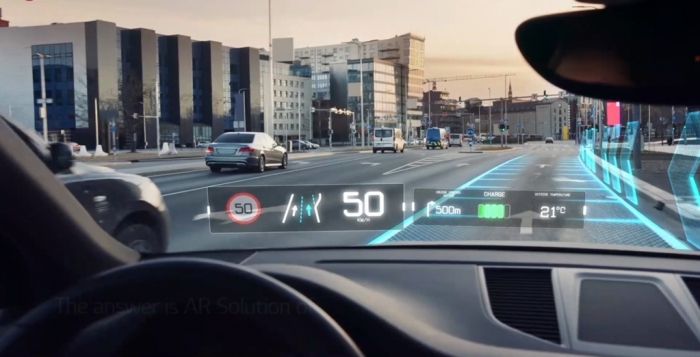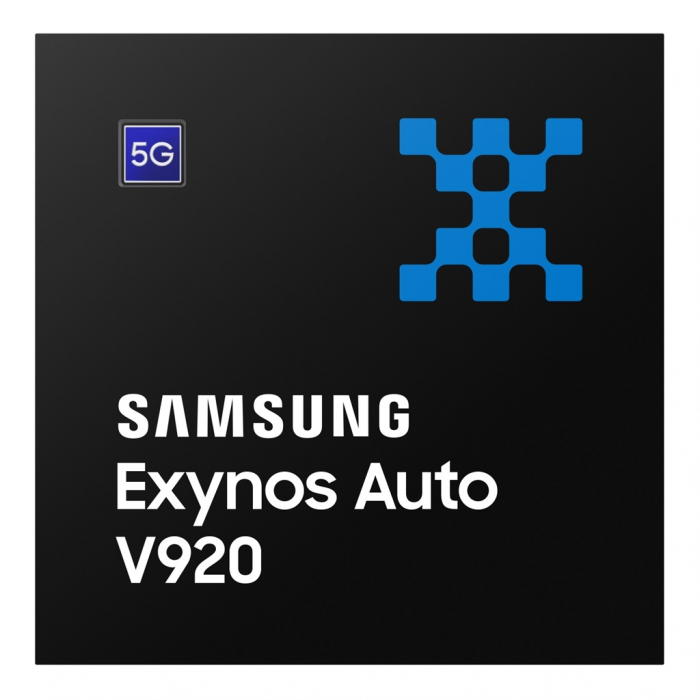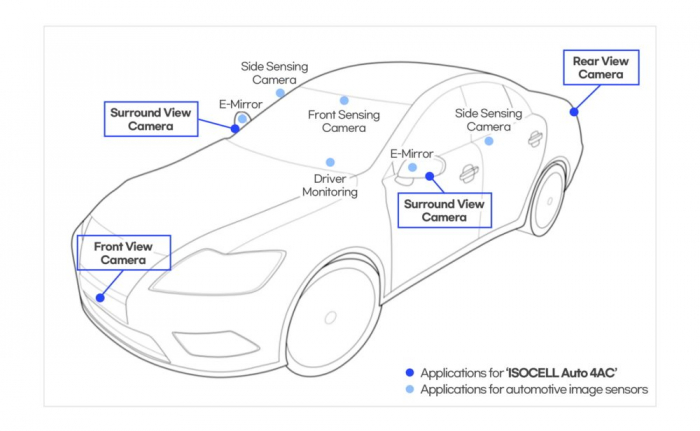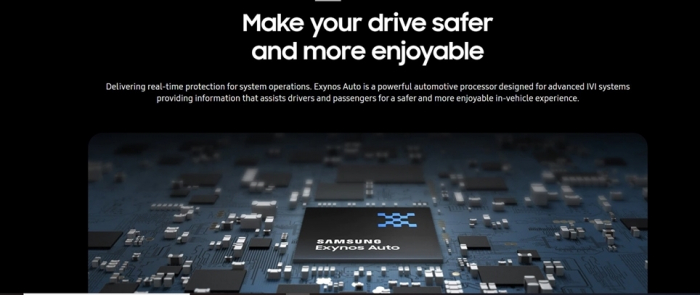Samsung to supply new Exynos auto chip to Hyundai in close tie-up
The two companies are strengthening their tech alliance to launch next-generation IVI systems in 2025
By Jun 07, 2023 (Gmt+09:00)
LG Chem to sell water filter business to Glenwood PE for $692 million


KT&G eyes overseas M&A after rejecting activist fund's offer


Kyobo Life poised to buy Japan’s SBI Group-owned savings bank


StockX in merger talks with Naver’s online reseller Kream


Meritz backs half of ex-manager’s $210 mn hedge fund



Samsung Electronics Co., the world’s largest memory chipmaker, said on Wednesday it will supply one of its latest automotive chips to Hyundai Motor Co. to support the carmaker’s advanced features in its in-vehicle infotainment (IVI) systems.
While Samsung has already been supplying various types of vehicle semiconductors, including image sensors, to Hyundai, the Exynos Auto V920 marks the South Korean tech giant’s first collaboration with Hyundai in application processor (AP) chips that control vehicle systems like the human brain.
Samsung said it will closely work with Hyundai to begin supplying the advanced auto chip as early as 2025.
“We are thrilled to be collaborating with Hyundai Motor. We anticipate that this partnership will further solidify our position in the automotive infotainment space,” said Pyee Jae-geol, executive vice president of Sales & Marketing, System LSI Business at Samsung Electronics.

NEXT-GENERATION IVI SYSTEMS
The Exynos Auto V920 will power Hyundai’s next-generation IVI systems, supporting six high-pixel displays and 12 camera sensors using high-performance, low-electricity LPDDR5 memory capacity.
The new chip, Samsung’s third-generation automotive processor for IVI systems, will deliver an optimal in-vehicle experience by enabling a real-time display of critical driving information as well as seamless playback of graphics-rich video content and games on multiple displays.
The V920 CPU packs 10 of British chip design company ARM Ltd.’s latest cores optimized for autonomous driving, enabling 1.7 times faster performance than the previous generation CPUs, it said.
Significant improvements have also been made to the processor’s graphics and artificial intelligence (AI) performance, enhancing visual presentation on displays and optimizing driver interaction with in-car information.
To provide a rich graphical user interface (GUI), the V920 integrates advanced GPU cores with graphics processing capabilities, which are up to two times faster than its predecessor.

By incorporating the latest computing cores, the neural processing unit (NPU) achieves 2.7 times greater performance than the previous generation.
The upgrades will allow the V920 to support enhanced driver monitoring features to better detect the driver’s state and swiftly assess the surroundings, providing an even safer driving environment, Samsung said.
The Exynos Auto V920 chip is compliant with Automotive Safety Integrity Level B (ASIL-B) requirements defined by the ISO.
SMARTER, MORE CONNECTED
Samsung has been strengthening its high-tech chip lineup as global carmakers are rapidly adopting autonomous and in-vehicle infotainment systems, which has upped the demand for advanced auto chips.

In November 2021, Samsung said it would supply the Exynos Auto V7 to Volkswagen AG for the German carmaker’s IVI system, Car Application Server (ICAS) 3.1, developed by LG Electronics Inc.
In September of that year, multiple industry sources said Samsung was manufacturing Tesla Inc.’s next-generation hardware 4 (HW4.0) chip for its full self-driving (FSD) cars.
Samsung is also supplying the Exynos Auto 8890 processor chip and the Exynos Auto V9 to Germany’s Audi AG.
The chipmaker’s ISOCELL Auto 4AC, its first ISOCELL image sensor tailored for automotive applications, is used by several carmakers, including Hyundai.
Hyundai Motor receives OLED screens from Samsung Display Co. For its electric vehicles, Hyundai receives batteries from Samsung SDI Co.
According to market researcher IHS Markit, the global auto chip market is forecast to grow to $143 billion by 2029 from this year’s estimated $76 billion.
Write to Ik-Hwan Kim and Ye-Rin Choi at lovepen@hankyung.com
In-Soo Nam edited this article.
-
 Korean chipmakersSamsung unveils Exynos Modem 5300 to rival Qualcomm, MediaTek
Korean chipmakersSamsung unveils Exynos Modem 5300 to rival Qualcomm, MediaTekMar 28, 2023 (Gmt+09:00)
1 Min read -
 Korean chipmakersSamsung’s new Exynos chipset enables short-range wireless connectivity
Korean chipmakersSamsung’s new Exynos chipset enables short-range wireless connectivityMar 21, 2023 (Gmt+09:00)
2 Min read -
 Korean chipmakersSamsung unveils new Exynos mobile chips for midrange smartphones
Korean chipmakersSamsung unveils new Exynos mobile chips for midrange smartphonesFeb 24, 2023 (Gmt+09:00)
2 Min read -
 Samsung to make Tesla’s HW 4.0 self-driving auto chip
Samsung to make Tesla’s HW 4.0 self-driving auto chipSep 23, 2021 (Gmt+09:00)
4 Min read -
 Korean chipmakersSamsung supplies self-driving, infotainment chips to global carmaker
Korean chipmakersSamsung supplies self-driving, infotainment chips to global carmakerDec 16, 2021 (Gmt+09:00)
4 Min read -
 Korean chipmakersSamsung’s new auto chip mounted in Volkswagen’s infotainment system
Korean chipmakersSamsung’s new auto chip mounted in Volkswagen’s infotainment systemNov 30, 2021 (Gmt+09:00)
2 Min read -
 Korean chipmakersSamsung to jump into laptop processor market with Exynos chip in H2
Korean chipmakersSamsung to jump into laptop processor market with Exynos chip in H2May 09, 2021 (Gmt+09:00)
2 Min read


